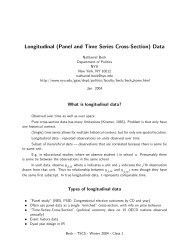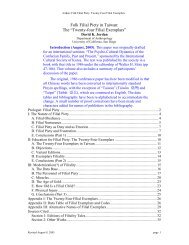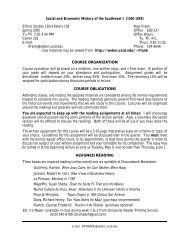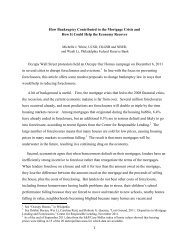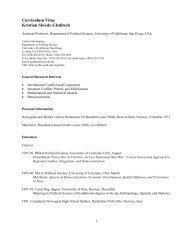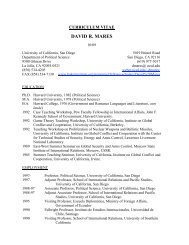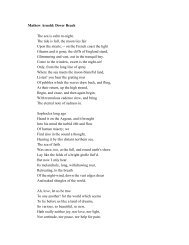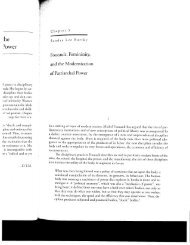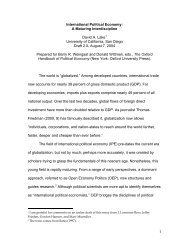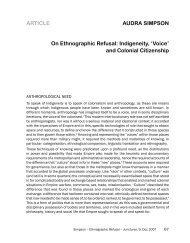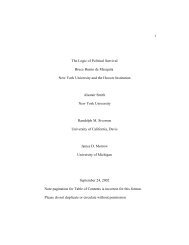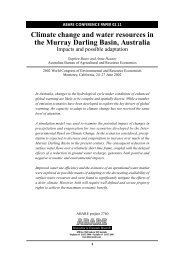Esperanto: The International Language of Humor
Esperanto: The International Language of Humor
Esperanto: The International Language of Humor
You also want an ePaper? Increase the reach of your titles
YUMPU automatically turns print PDFs into web optimized ePapers that Google loves.
s<br />
tr2-'..<br />
1{.<br />
'-tL<br />
Abstuct<br />
Tltis urticlc distingui.rlrcs four types <strong>of</strong> joking: languuge-free ' language'<br />
tlcpctttlcttt, culturc-dcpctrclenl, tud interlanguagc' Euch <strong>of</strong> tlrcse is discussed<br />
for Dsperatrto, slrcssittg ccrt-9j4!911tyres <strong>of</strong> thc-EsperattlQ speeclt conurtuttity<br />
-<br />
that le nd euch <strong>of</strong> tlcm qiloiity i,r Espnranto. TIrcse features<br />
^UiiL are ( I )<br />
tlnr EspcratrTo f, uorrroi,lty isett (or is intentlcdfor use) between pcople who<br />
do nol slurre a contnlon langwtgc and therefore have some differcnces itr<br />
cultural backgrotucl as well; (2) that <strong>Esperanto</strong> is an ogglutinative language<br />
llrc constuclion <strong>of</strong> language'<br />
witlr certaitt inlte rettt linguistic possihititie s for<br />
tlepctulcnt joke.r; (3) that Espcrarrto has-3Ly9j2!e4,c1tltuye-<strong>of</strong> its owtt<br />
spieeclr comnunity: and (4) tlwr few tpiafrrs <strong>of</strong> <strong>Esperanto</strong> qre entirely<br />
jUrnr, and all arc al lcasl asfuettt irt one or more olher languages'<br />
Bricf history <strong>of</strong> EsPeranto<br />
j<br />
<strong>Esperanto</strong>: the international<br />
language <strong>of</strong> humor; or,<br />
What's funnY about EsPerantoT'<br />
DAVID K. JORDAN<br />
Thcautlroro[EspcrantowasoneL.L'Zamenh<strong>of</strong>(1859-1917),aPolish<br />
optomctrist (cxccpt thirt Poland was Russia in thosc days)' who had bccn<br />
posscsscd from childhood with thc i
i44 D. K. Jordau<br />
original, hc figured Espcranto was not finishcd yct' As a rcsult' thc simplc<br />
brocrrure or- lggT was actuaily the tip <strong>of</strong> a vcry considcrabrc linguistic<br />
icebcrg. Not surprisingly, <strong>Esperanto</strong> is thc only manrnadc languagc that<br />
has actually dcvelopci :r substantial community o[ spcakcrss and a<br />
considcrablc literaturc.6 And, to the bcst <strong>of</strong> our knowlcdgc' it is thc only<br />
artificial languagc rcgularly uscd to makc jokcs'7<br />
Thrcc kinds <strong>of</strong> humor<br />
For prcsent purposes' I shall bc concerncd with publishcd works itl<br />
Esp"ianto. For onc thing, thcse are casier to cxaminc' For anothcr' the<br />
worldwidc but vcry tlrin distribution <strong>of</strong> Espcrantists mcans that writing, in<br />
comparison with spcaking, is lnore important in Espcranto tlran in cthnic<br />
languagcs.<br />
I shall distinguislr thrce kinds <strong>of</strong> humor. <strong>The</strong> first kind is bascd on tltc<br />
contcnt <strong>of</strong> thc joke and may rcadily be translatcd from onc languagc to<br />
another. It may be that the spcakers <strong>of</strong> onc language find such a joke<br />
funnicr than the speakcrs <strong>of</strong> another language' but' at lcast as far as<br />
languagc is conccrncd, suctr a jokc is translatablc' l shall call this tltc<br />
"languagc-l"rsg" jokc.<br />
Thcsccondsort<strong>of</strong>jokcmakesuse<strong>of</strong>thelinguisticrcsourccs<strong>of</strong>tlrc<br />
languagcinwhichitistold,andisvcryc|ifl"iculttorcrrdcrintoarrotlrcr<br />
tunguog". Puns and ncar puns are a good cxamplc <strong>of</strong> this sccond sort <strong>of</strong><br />
vcrbal clowning. Punning probably exists in atl or ncarly all languages' but<br />
any givcn pun is dcpcndcnt upon a particular languagc' (A collcaguc<br />
spcaks <strong>of</strong> writing articlcs on a "word possessor"' [or cxamplc' That is<br />
distinctlyurl|unnywhcntrans|atedintoalanguagcinwhich..proccssor''<br />
and "posscssor" arc unrclatcd') But therc arc othcr linguistically bascd<br />
jokcs as wcll; for examplc, thc following:<br />
l. turns <strong>of</strong> phrase thaf produce onotnatopocic combinations <strong>of</strong> sounds<br />
(such as "giggly wiggly children");<br />
2. cxprcssions that allude to provcrbs (such as Archic Bunker's wondcrful<br />
provcrb, "One man's goosc is another man's gandcr");<br />
3. cxprcssions that oildly concatenatc lcvcls <strong>of</strong> politencss or fornlality<br />
(such ai, "Could you bc so kind as to cranl it?");<br />
4.cxprcssionsthatmakeneworunusua|usc<strong>of</strong>rulcs<strong>of</strong>morpltologyor<br />
syntax (such as speaking <strong>of</strong> spouses as "spicc")'<br />
All <strong>of</strong> thcse typcs <strong>of</strong> verbal play can bc lumpcd togcther undcr thc titlc<br />
l4/hot's funny oboul E.speranto? I45<br />
"larrguagc-dcpcndcnt" to contrast with our earlicr catcgory <strong>of</strong> "languagcfrcc.<br />
"<br />
Tlrcrc is, as wcll, a third typc <strong>of</strong> humor, onc which depends upon<br />
sharing thc culturc, rathcr than tlrc languagc, <strong>of</strong> thc jokestcr. It may bc<br />
languagc-dcpcndcnt, but morc importantly it is culture-dcpcndcnt. An<br />
cxamplc would bc allusions to local cvents, particular pcoplc, and so on. A<br />
rcccnt evcnt in Amcrican politics was refcrrcd to by telcvision humorist<br />
Mark Russell as "Cippcrgate," an cxprcssion that makcs sense only to<br />
A nrcricans.<br />
Finally, a fourth typc <strong>of</strong> humor occurs through thc interaction o[<br />
Esper:urto with othcr languagcs. This is common enough but occurs in<br />
most languagc-lcarning situations and is not <strong>of</strong> much thcorctical intcrcst.<br />
Constraints on humor in Espcranto<br />
So wlrat happcns in Espcranto? Tlrc answcr is that all thrcc types <strong>of</strong> vcrbal<br />
clowning cxist, and all havc thcir own particular flavor. I shall arguc hcrc<br />
that thrcc significant facts about Espcranto providc constraints on joking<br />
in tlrat languagc that arc normally not as signilicant clscwhcrc.<br />
Thc first is that Espcranto is dcsigncd for usc across languagecommunity<br />
boundarics, which almost by dcfinition arc also cultural<br />
boundarics. Constant attcntiou must thcrcforc bc paid to the translatability<br />
<strong>of</strong> thc cultural cotttcxt <strong>of</strong> thc jokc. :<br />
Sccond, nrost speakcrs <strong>of</strong> Espcranto speak. it as a sccond languagc,<br />
usually quitc impcrfcctly.s This mcans that many scc a frcshncss in rather<br />
simple jcsts that would secnt hackneycd in othcr languagcs, but that many<br />
<strong>of</strong> thcm also fail to apprcciatc somc attempts at humor bccause thcy do<br />
not undcrstand them, At thc samc timc, therc is a considcrable rangc <strong>of</strong><br />
nrastcry <strong>of</strong> Espcranto, and thosc who know it wcll somctimcs enjoy<br />
involutcd linguistic byplay sirnply bccausc it is involutcd and thus<br />
dcmonstratcs mastcry <strong>of</strong> the languagc. Although thcre is probably sonrc<br />
<strong>of</strong> this motivatiott among vcrbally oricnted pcople speaking any languagc,<br />
it sccnrs to mc to bc particularly promincnt in <strong>Esperanto</strong>, whcre the range<br />
<strong>of</strong> adult lnastcry is so vcry widc.<br />
Third, thc cornmunity <strong>of</strong> <strong>Esperanto</strong>-spcaking pcoplc sharcs ccrtain<br />
"xpcricnccs which outsidcrs do not sharc, just as docs any group <strong>of</strong><br />
communicating people. Thcsc cxpcricnccs can bccomc thc subjcct mattcr<br />
<strong>of</strong>joking, providing in-culturc jokcs just as nativc to <strong>Esperanto</strong> as jokes<br />
i
146 D. K. Jordatr<br />
about the Kncsset are native to Israel or jokes about Ma Bcll arc nativc to<br />
Americans.<br />
A|l threc oI thesc constraints _ intercultural usc, inrpcrfcct nrastcry by<br />
many speakers, and the dcvclopmcnt <strong>of</strong> a ccrtain amou.nt <strong>of</strong> indigcnous<br />
<strong>Esperanto</strong>cu|ture_mustbckcptinmindasldiscussthelanguage-frec,<br />
language-dcpendent, culture-dependcnt, and intcrtanguagc kinds <strong>of</strong><br />
vcrbal play.<br />
<strong>Humor</strong> tyPe I: language-free humor<br />
Zamenhol himself was not much <strong>of</strong> a jokcster,e but facctious "anccdotes,"<br />
olten translated, make up one 3O-page section <strong>of</strong> an carly<br />
compcndiumoIEspcrantotextsbyvariouswritcrsthatZamcnh<strong>of</strong>editcd<br />
toserveasamode|<strong>of</strong>good<strong>Esperanto</strong>sty|e(Zamcnh<strong>of</strong>l903:scction3).<br />
Many<strong>of</strong>thesesccmtoustodayespcciallytorcflcctthcethoso[castcrn<br />
Europc at the end <strong>of</strong> thc last ccntury' Here is an example:<br />
Iundcrstand,saidsomconc,thattheycanmakeinstrumcntsandcxplorctlrcstars<br />
and plancts with them; thii is managcablc' But how do the scientists know the<br />
nrt.<strong>of</strong>eachstar?Thislhavcnevcrbccnablctoundcrstand!(1903:64)'<br />
Amanvisitcdabarbcrtohaveahaircutandashave.Ashcsatinthebarbcrchair,<br />
he noticcd that thc barbcr's dog was sitting looking at him cspccially intcntly' Hc<br />
rcmarkcd on this to the barbcr] who cxptaincd, "Ycstcrday I cut <strong>of</strong>r a man's car,<br />
and he is hoping I will do it again"'<br />
<strong>Esperanto</strong> literature has, <strong>of</strong> course, produccd much morc sophisticatcd<br />
worlS.s <strong>of</strong> languagc-frce humor, howcvcr' One such writer was Siindor<br />
Szathmiri(1897-1974), whose Voyage to Kazohinia(1958) is dcsigned as a<br />
scqucl to Swi[f's Gulliver's Travels.to writtcn in surprisingly swil'tlikc<br />
prose, thc book pursues Gu|liver as hc visits Kazohinia, a |and where<br />
everything is annoyingly rational' When he decides hc bannot put up with<br />
all this rationality ony *o,", he flees to the land <strong>of</strong> the Beohins' who arc<br />
cntirelyirrational,r"hi"hi,justasmaddening'Anothcrsatiricalnovclis<br />
an autobiographical work by a Swiss-English salcsman' Cesare Rossctti'<br />
callc
148 D. K. Jordan<br />
|etters,.Thatisnottoobadadcfinition<strong>of</strong>|itcrature,pcrhaps,butitis<br />
accidental: a Pun.<br />
Bclorethefina|.o(fornouns)or.a(foradjcctivcs)orotlrcrcndings(|or<br />
othcr things), <strong>Esperanto</strong> <strong>of</strong>tcn adds to the root onc or morc sulfixcs that<br />
changc its rncaning to producc a dcrivcd conccpt'16 Thus -a7'- relcrs to a<br />
concrcte manilcstation <strong>of</strong> somcthing, (Hence literalura.'io lncans a work <strong>of</strong><br />
litcraturc.) similarly -cr- is a sufllx mcaning a part. Thcrcforc 't litero rniry<br />
mcan a lcttcr <strong>of</strong> thc alphabet (liter'o), but altcrnativcly it may bc takcn as a<br />
compound<strong>of</strong>li|.er-o,hcncc,.part<strong>of</strong>abcd'.Undcrstoodthisway,/itcra<br />
turo can mcan 'towcr <strong>of</strong> bcd Parts' !<br />
tn addition to thc usc <strong>of</strong> affixes, Espcranto shows grcat flcxibility, as<br />
GernranandChincscdo,incrcatingcompoundsbythcsinrp|c|irrking<strong>of</strong><br />
roots. 'simultancous', for cxamplc, is .sunr-tcmp-4, froltt .rdrrl- 'sanrc' pltts<br />
tenrp-'Lime'(plus thc tcrminal -o to makc it an adjcctivc)'r?<br />
Schwartz saw and madc use <strong>of</strong> suclr ambiguities to crcatc marvclously<br />
sprightly vcrscs. Here is thc most lamous <strong>of</strong> thcm. It discusscs tlre scvcn<br />
ug",=<strong>of</strong>rnun,namingeachwithawor
f 50 D. K. Jordsn<br />
Nc F(i)unu!:trc'nol'+y'- (prefix denoting immorality) -ulr- (wildcard<br />
su{[x uscd for idiosyncratic forrnulations)2r -u (impcrative markcr)<br />
OR lorr- 'smoke' -u (impcrativc suflix):EITHER 'No smoking!'<br />
OR 'No immoral bchavior' (with thc conscqucnt irnplication that<br />
smoking is immoral).<br />
<strong>Humor</strong> typc Ill: culture-depcndcnt humor<br />
Finally, lct us turn to jests that dcpcnd upon thc "culturc" o[ thc<br />
Espcranto-spcaking community itself. By "culture" I mcan thc shared<br />
understindings <strong>of</strong> the community, or <strong>of</strong> many mcmbcrs <strong>of</strong> it. Knowing<br />
about Raymond Schwartz, or even about Zamenh<strong>of</strong>, is an idiosyncrasy <strong>of</strong><br />
Espcrantists. It follows that jokcs about thcnr arc ncccssarily "in-jokcs."<br />
In-jokcs arc much apprcciatcd by all sorts <strong>of</strong> groups, pcrhaps partly<br />
bccausc the ability to undcrstand thcm shows that onc is mastcr o[ a body<br />
<strong>of</strong> lore unknown to outsiders. Indced in <strong>Esperanto</strong> in-jokcs that rcquirc a<br />
very thorough knowlcdgc both <strong>of</strong> the languagc and <strong>of</strong> the organizations<br />
and individuals who use it are rcgardcd by somc as cspccially dclicious for<br />
exactty that rcason. One work (MacGill 1986), with the improbablc namc<br />
<strong>of</strong> Stret' et, Steti-skei'(approximately "Even winding up: skits by Stefan<br />
MacGill") is fillcd with verbal play unintelligible to those whose mastcry<br />
<strong>of</strong> Espcranto does not include a mastery <strong>of</strong> Espcranto culture. Intercstingly,<br />
thc work won critical praisc lor cxactly this rcason.22<br />
Espcranto has dcvclopcd ccrtain exprcssions that dcrivc cntircly front<br />
its own history or the daily lives <strong>of</strong> its members qua Espcrantists. Thrcc<br />
clear cxamplcs <strong>of</strong> such words, not neccssarily jokcs, are tlrc words<br />
krokodilo, sovu!,ulo, and kahei. Thcse rcspectively mcan 'crocodilc',<br />
.savage', and nothing at all. But thcy havc taken on much broadcr<br />
connotations:<br />
Krokodilo: a crocodile puppet was uscd in a famous direct-mcthod<br />
Espcranto coursc by way <strong>of</strong> comic relicf. Thc crocodilc always spokc<br />
languagcs othcr than <strong>Esperanto</strong>, and pcoplc who spcak languagcs othcr<br />
than Espcr4nto in <strong>Esperanto</strong> mcctings arc now callcd "crocodilcs";<br />
indccd, thcrc is evcn x vcrb: krokodili'to crocodilc'.<br />
Sova[,ulo: A "savagc" is a pcrson who does not makc a rcscrvation for an<br />
Espcranto convcntion but appears at thc last minutc expccting to bc<br />
accommodated.<br />
Wlrut's funny about EsPeranto? l5l<br />
Kahci: Kabc (Kazirnierz Bcin, | 8?2-1959) was a talented carly Espcranto<br />
stylist, who bccarnc discouragcd with thc movcmcnt for Espcranto and<br />
abruptly abandoncd it. To bc a kabeo is to be an apostatc, and the verb<br />
kabci cantc to mean 'to apostacizc'.<br />
All thrcc tcrms arc closcly linkcd to Espcranto lifc. All <strong>of</strong> them began as<br />
slight jcsts. All thrcc lravc bccomc cntrcnched.<br />
In-jokcs do not always bccomc cntrcnchcd, <strong>of</strong> coursc; nor do thcy<br />
ncccssarily rcflcct on such more or lcss gcncral problcms in Espcranto lifc<br />
as apostasy, using thc wrong languagc, or failing to makc a rcservatiotr.<br />
In the carly 1960s a pscudonyrnous booklet appcarcd callcd "How to<br />
(Un-)Dcfcat Espcranto" (Kiel (Mal)Venkigi <strong>Esperanto</strong>n), reprinting a<br />
scrics <strong>of</strong> articlcs satirizittg thc shortsightedncss <strong>of</strong> Esperantists trying to<br />
pronrotc thcir causc. Onc chaptcr dealt with a mining company discovcring<br />
tlrc world's most unyiclding substancc, <strong>of</strong> a lrardncss much<br />
cxcccding diamonds, callcd lapetrilo. Although the suffix -ilo propcrly<br />
narncs nrincrals in Espcranto (as docs its cognatc -ite in English), thc root<br />
<strong>of</strong> thc namc <strong>of</strong> this imaginary mincral conlcs from thc namc <strong>of</strong> Ivo<br />
Lapcnna, thcn prcsiclcnt <strong>of</strong> thc Univcrsal Espcranto Association, and<br />
rnuclr criticizcd for his unyiclding manncr. Thus lopcnito had [or Espcrantists<br />
<strong>of</strong> that cra something <strong>of</strong> the samc implication as a mineral named<br />
"Nixonitc" might have had for somc Americans a fcw ycars later. An<br />
undcrground satirical pocm about thc samc individual was called Za<br />
Penado,'Tlre Striving<br />
Thcsc planctwidc localisms <strong>of</strong> thc <strong>Esperanto</strong>-speaking community<br />
suffcr in translation the way all in-jokcs do. Thcy cxist because Esperantists<br />
arc a corporatc 'group, and corporate groups havc common<br />
cxpcricnccs that providc the raw materials for jokcs about common<br />
cxpcricnccs. Two forccs work in opposite directions to cncourage this<br />
tcndcncy. On thc onc hand, thc scnsc <strong>of</strong> group membcrship brought by<br />
having a common languagc, particularly whcn it is not widely sharcd,<br />
cncouragcs thc devclopmcnt <strong>of</strong> symbols <strong>of</strong> that mcmbcrship. <strong>The</strong> in-jokc<br />
is onc such symbol. On thc othcr hand, howcver, thc rclativcly small<br />
numbcr o[ Espcrantists, <strong>of</strong> whom many arc not flueut, and who sprcad<br />
across nations with diffcrcnt traditions and expcctations about humor<br />
(and differcnt flashpoints for taking <strong>of</strong>lcnce) militatcs against thc elaboration<br />
<strong>of</strong> thcsc kinds <strong>of</strong> jokcs. Still, thcy cxist.
lJ^l D. K. Jordan<br />
<strong>Humor</strong> typc IV: nationalisms<br />
A common, but almost by dcfinition minor, typc <strong>of</strong> rrumor in Espcranto<br />
involvcs jokes that play Espcranto <strong>of</strong>f against somc othcr languagc. To<br />
'[arc' or 'gct on' is farti in Espcranto, and 'How are you?' is-nornraily<br />
exprcsscd Kiel vi farras? It is a rare Amcrican lcarncr that docs not<br />
expcricncc this as asking, quitc Iitcralry, 'How do you fart?' a'd jokcs,<br />
circumspcction, or shock are unavoidabrc rcsurts in bcginning crasscs. I<br />
oncc lreard onc Amcrican Espcrantist ask anothc r Kier vifarta.r?Thc rcpry<br />
was, "wcll. Loud and wcil." similarry, it is amusing to somc to<br />
portmantcau idioms into Espcranto from othcr ranguagcs. Thus thc<br />
maladroit literal translation <strong>of</strong> 'He gets my goat' into ri havigas nriorr<br />
kapron may draw a smile if it is not proposcd scriousry. Interlanguagc<br />
humor <strong>of</strong> this kind is common to ranguage-rcarning situations in gcncral,<br />
howcver, and is hardly pccuriar to <strong>Esperanto</strong>.If anything may disiinguish<br />
it in Espcranto from its occurrcnce in othcr ranguagcs, it wourd pcrhaps bc<br />
that in <strong>Esperanto</strong> nearry ail noninternationar Espcranto co'tacts arc<br />
languagc-lcarning situations, and hence there arc more opportunities for<br />
the creativc usc and exploitation <strong>of</strong> intcrlanguagc phcnomcna.<br />
Conclusion<br />
If humor is the intcrnationar ranguagc, Espcranto (whicrr rcalry is thc<br />
international language) can be humorous, too. I hopc I havc left ytu with<br />
the firm imprcssion that <strong>Esperanto</strong> shares with othcr lungragcs scvcral<br />
basic ways <strong>of</strong> being funny. I have also tricd to underlinc sonrc <strong>of</strong> thc<br />
constraints that shape <strong>Esperanto</strong> humor preciscry bccausc <strong>Esperanto</strong> is<br />
still a language with a very high proportion <strong>of</strong> subcompetcnt spcakcrs and<br />
no geographically contiguous popuration. Now by way <strong>of</strong> concrusion rct<br />
mc tcll an <strong>Esperanto</strong> joke:<br />
Thrcc guys go into a bar, a Catholic, a protcstant, and a Jcw. onc is polish, onc<br />
English, and one chincse. Ail havc mothcrs-in-raw.. <strong>The</strong> pole, who is arso thc<br />
Cath<strong>of</strong> ic' says to thc bartcndcr, " Ekjubireju! Givc mc a bccr!" Thc Engrishman,<br />
who is also thc Protcstant, says to thc bartcndcr, ".Sava Mar,sanrideanoj,iciu" ,,,.<br />
a bccr!" Thc rcmaining Espcrantist (who is thc chincsc Jcw), altcr riri.ni'g to trr.<br />
othcr two, looks thc bartendcr in the cyc and says, ..1,m a Kabc; g'ivc mc<br />
champagnc!"<br />
University <strong>of</strong> California, Sq1 Diego<br />
Notcs<br />
What,s ftuury about Esperartto? I53<br />
l' Trris articlc originatcd. as a papcr for the rggT<br />
confcrcncc'<br />
Intcrnationar<br />
Thc wFIrM<br />
trrcnrc in r.rumor<br />
rggT was "llun'or,'itr"worr
154 I-r. K. Jordan<br />
aspccts <strong>of</strong> thc sociology <strong>of</strong> the language and analyzes its succcss rclativc to Volapiik<br />
and ldo, two carlY compctitors'<br />
7. For prcscnt pu,po'"', ]'<strong>of</strong>in, and wit (or jokcs an
t-.v t./. h. Joralun<br />
Balano, Johin<br />
1982 eu .ii nortu tro-like? Anrwerp: TK/Srafcto.<br />
Bcaucairc. Louis<br />
1970 Kruko kaj Baniko er Bcrvaro: nnrdccaj ancktrotoj por neprudaj tegantoj.<br />
Copcnhagcn: TK.<br />
S""19#r., nr!!il" vivo tle hervalo scnraigulo: nuldeco epizodaro.La Laguna: R6gulo.<br />
_ 1962 Specintene. La Laguna: R6guto.<br />
Borovskj', Karel llavliiek<br />
l95l r-a hapto de caro vradintir: regcntro er ra ru.sa historio,translatcd from thc<br />
Czcch bv Tomi3 pumpr. La Laguna: Rcgulo.<br />
Boulton, Marjorie<br />
a",jr|l,lr,. ,. Zancnlrcf: creator <strong>of</strong> E.speranto. London: Rourlcdgc and Kcgan paul.<br />
Ilistorio tle Esperunlo. Bcllcrivc-sur-Allicr: privatcly<br />
o.J.o* published.<br />
e.<br />
r93l Hi'rtorio de ra.ntondoringvo: tri jarccntoj tra ser6ado,2ndcdition.<br />
3rd<br />
Rcprintca<br />
edirion (1967). as<br />
Osaka: pirato.<br />
Forster, Peler C.<br />
Gilberr. William St979a<br />
?^r!!Ji'"' de Penzaico' Reto Rosselti (trans')' Manchcstcr: Espcrantaj<br />
1979b 'r'a piratoj de penzanco, Mary Towerscy, music dircctor. London: pJS 7g<br />
(ralr recording).<br />
I laglcr. Margaret<br />
l97l <strong>The</strong> Esyxranto languagc as a litcrary mc.ium. Unpublishc




